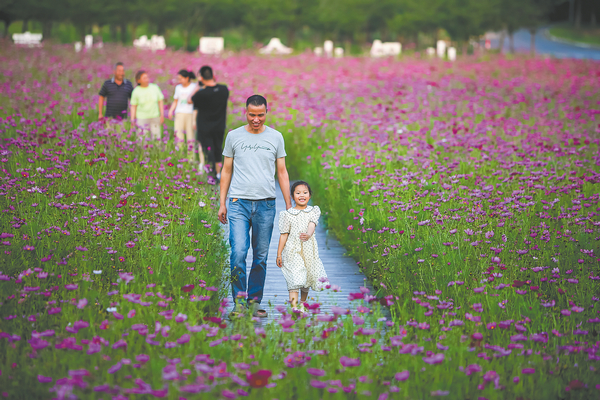

"The place is really nice and convenient for all of us to get to," he says.
About five minutes away by car, Jiangxiaoju orange park has been a rural getaway for visitors, many of whom travel from other parts of Zhejiang, nearby Shanghai and Jiangsu province to pick oranges and go camping.
"Travelers peak on weekends and holidays, when we usually receive about 400 to 500 guests a day," says Li Guangchuan, a manager in charge of the park's operations.
The park started receiving guests in June last year and has offered employment opportunities to many senior villagers, who help offer tourism services.
"They are mostly aged above 60 and earn a monthly salary of 4,000 yuan ($560)," Li says. "We also built an online platform to connect orange farmers with customers, which has significantly expanded sales channels."
Chenxiang village is home to nearly 67 hectares of orange groves. Local authorities have improved the environment and infrastructure and created rural homestays from houses that were standing idle, during the construction of the park.
The move has not only raised the living conditions for villagers, but also increased the sales of their oranges, as well as the number of visitors, says Wu Jiabin, a village official. "Now, the annual income of villagers has reached around 60,000 yuan, a win-win situation in terms of economic and ecological benefits."
Approximately two hours to the south by car, modern cafes and homestays are tucked away in a landscape of mountains and lakes in Fengyi village of Haiyan county in Jiaxing.
Many tourists can be seen strolling through the woods, chatting over coffee and camping on the grasslands in early November.
"Sometimes, it is still a little hard to imagine that over a decade ago, this place was once a dusty, barren sand and gravel quarry," says Jiang Guiying, owner of a grocery store in Fengyi village.
"At that time, the air was filled with dust, and after a day of work, our nostrils were filled with it," she recalls, adding that her family only earned between 1,000 yuan and 2,000 yuan a year.
About a decade ago, quarrying was the lifeblood of Fengyi. However, due to large-scale overexploitation, the mountain's ecosystem was damaged, and with the loss of vegetation came dust storms on sunny days and muddy water on rainy ones.
In 2016, the mines were closed and efforts were made to turn them into fields of blossoming flowers and tea gardens, says Zhu Mengdi, a publicity officer for the village.
Starting in 2017, the village began integrating natural, historical and cultural resources to create distinctive visitor experiences, featuring mountain hikes, lake visits, egret spotting, tea picking and tasting, and seasonal cherry blossom-related activities.
In 2022, the village was named by the Jiaxing government as its top-rated tourism village.
In the first six months of this year, Fengyi received more than 286,000 visitors, generating a tourism income of over 11.6 million yuan.
Zhao Shengbo, who opened an art studio that renovates and paints zaotou (kitchen stoves) in 2021, has benefited from the tourism boom.